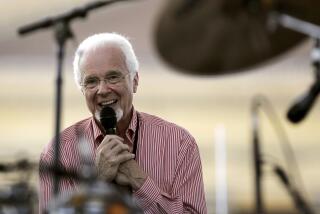Eric Reed: Accomplished Musician at Any Age
- Share via
At 19, Eric Reed is two years younger than Harry Connick Jr. and 20 years wiser. Appearing Friday at the Biltmore’s Grand Avenue Bar, this phenomenal young pianist offered new evidence of the advances he has made since he performed, only months ago, as a student in a college band at Cal State Northridge.
Though his technique is formidable, he rarely lets it run away with him; in fact, during “Lover Man,” the only ballad of the set, there were moments of bare-bones simplicity, followed by an intriguing passage of block-chords style during which both hands moved in lock step.
Capably supported by Tony Dumas on bass and Chuck McPherson on drums, Reed drew on the lore of the great post-bop compositional masters, starting with Wayne Shorter’s “Yes and No” before moving on to the works of Cedar Walton, Miles Davis and Thelonious Monk. For the Monk segment he played unaccompanied, bringing something of the composer’s own quizzical dissonances to “Ruby My Dear” and “Crepuscule for Nellie.”
That Reed was able to concentrate and play as impressively as he did was doubly remarkable in the light of the room’s noisy conditions, for this was a typically rowdy Thank God It’s Friday crowd. By the end of the set, closing with a B-flat blues that straddled several decades with its Earl Hines tremolos and lightning runs of 16th notes, he had the listeners truly paying attention.
Reed’s hands and feet are firmly planted in the rhythmic, harmonic and modal roots of the 1980s. By the year 2000, perhaps much sooner, he will have become one of the most valuable new contributors to this century’s final decade.
More to Read
The biggest entertainment stories
Get our big stories about Hollywood, film, television, music, arts, culture and more right in your inbox as soon as they publish.
You may occasionally receive promotional content from the Los Angeles Times.








